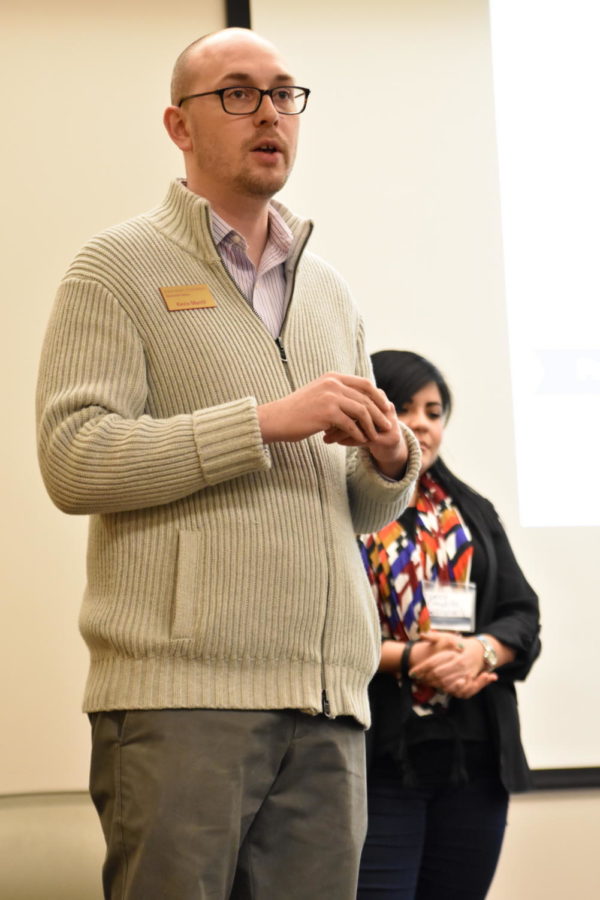Gaining experience outside the classroom with ISU StuOrgs
April 5, 2018
With more than 850 student organizations at Iowa State, a variety of options exist for students looking to join an extracurricular organization.
Whether one participates in existing organizations or registers their own, students can expect to find opportunities for more than enjoyable conversations.
The biggest benefits of joining a student organization involve students gaining access to events and responsibilities that can help them build up their academic, personal and career-building portfolios, said Kevin Merrill, assistant director for student organizations, leadership and service for the Student Activities Center (SAC).
“I think it’s really important for students to be able to find other students that are interested in what they’re interested in. Sometimes majors don’t fit with what students want to do in their career. [Student organizations] can fill that void,” Merrill said.
Merrill said that student organizations help supplement the career, academic life and goals of students outside of the classroom, as they involve the real-world experiences they receive when collaborating with others and organizing activities involving the organization’s interests.
“Being able to handle [student organization] money and leadership and being able to access resources [as a student organization] is impactful on student leadership and personal growth,” Merrill said.
Merrill’s job in the SAC involves helping students in student organizations access available resources and guiding students through the process of becoming a student organization.
The process generally requires initially filing an online organization profile with the SAC that includes the registration of at least five members including a president, treasurer and organization adviser; filing an online constitution for the organization including the club’s purpose; filing an operations manual, and filling out the Compliance Agreement Form, according to the SAC website.
These documents, once completed, must then be approved by the SAC center (usually by Merrill) before they are submitted for final approval by the Student Organization Recognition Board (SORB), Merrill said.
In order to be approved by SORB, students must meet the board and present their organization’s purpose and goals, Merrill said.
Chloe Serp, senior in mechanical engineering, is currently in the throes of that process, as she is looking to become the president of her own student organization. Serp is looking to create a student organization for women in mechanical engineering and is waiting for SORB to approve the organization’s finished application.
For Serp, motivation to create a registered organization for women in mechanical engineering comes from the fact that women in the program are generally few and far between, she said.
“We have a very low percentage of females for grads, undergrads and faculty. I wanted to start this club so [women] will recognize a friendly face in class,” Serp said.
A professional and personal goal Serp also has in starting this student organization involves learning how to better broaden outreach to young women about jobs in engineering.
Being a registered organization, and therefore able to participate in events like ClubFest and have easier access to budget opportunities, can help with that goal, Serp said.
For Cassidy Welch, senior in child, adult and family services, her experiences participating in student organizations like CyServe Council and working as a member of the Leadership Education And Development (L.E.A.D) team in the Leadership and Service Center, have been extremely impactful in her development of professional skills and meeting professional goals, she said.
“When I was a freshman, I’d dreamed of going from a [general member] to the leader of a large club…[and] when I joined CyServe, I met staff in the Student Activities Center that helped me gain networking opportunities, [and I learned] how to multitask and manage my time better…Now I’m the [organization’s] co-president,” Welch said.
It was through networking in CyServe Council, Welch said, that she gained access to the opportunity to work as a L.E.A.D. team member in the Leadership and Service Center.
Through both experiences, Welch has frequently helped plan large events like CyServe Day and TEDxIowaStateUniveristy on campus, as well as retreats, conferences and other programs like the Non-Profit Protégé Program, which pairs Iowa State students with non-profit executive directors or CEOs so they can job shadow them to learn about non-profit management, Welch said.
Her experiences planning these events, Welch said, have been invaluable, and have inspired her to pursue a career working with nonprofits as an event planner.
“Having these experiences [outside of the classroom] has helped me meet a lot of people and helped me find my passion. [They also helped me] combine my academic interests with real life, [and gave me] that pre-professional experience in a college setting,” Welch said.
To anyone looking for additional pre-professional experiences in college or looking for a place to spend some time after classes, Welch would recommend trying out a student organization—or creating one if they can’t find one they like, she said.
“Go to ClubFest and pick out a few organizations that sound good, or that interest you, or maybe find a club you don’t know much about. Then, try to go to a few meetings,” Welch said.







